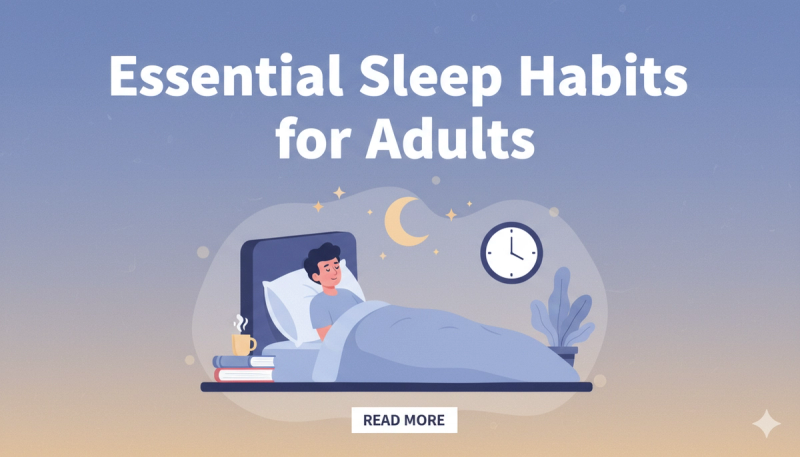Essential Sleep Habits for Adults: Unlocking Your Best Rest

Sleep isn’t just a luxury—it’s a biological necessity. For adults, getting quality shut-eye directly impacts everything from mood and productivity to long-term health. Yet, with busy schedules, screen overload, and endless to-do lists, prioritizing sleep often takes a backseat. By adopting essential sleep habits for adults, you can transform nights of tossing and turning into restorative rest. This guide breaks down scientifically-backed strategies to help you fall asleep faster, stay asleep longer, and wake up refreshed—without relying on quick fixes or gimmicks.
Why Sleep Matters More Than You Think
Before diving into habits, let’s quickly revisit why sleep is non-negotiable for adults. During sleep, your body repairs cells, consolidates memories, and regulates hormones like cortisol and melatonin. Chronic sleep deprivation (consistently getting less than 7 hours nightly) increases risks for heart disease, diabetes, depression, and weakened immunity. It also impairs decision-making, creativity, and emotional resilience. In short, investing in sleep isn’t self-indulgent—it’s self-preservation.
Building Your Sleep Foundation
1. Master Your Sleep Environment
Your bedroom should signal to your brain that it’s time to wind down. Start by optimizing these elements:
- Darkness: Use blackout curtains or an eye mask to block light. Even small amounts of light (like streetlamps or electronics) can suppress melatonin.
- Cool Temperature: Aim for 60–67°F (15–19°C). Your body’s core temperature drops during sleep, and a cooler room facilitates this process.
- Quiet: Eliminate disruptive noises with earplugs or a white noise machine. If silence feels unnerving, try nature sounds or gentle fan hum.
2. Stick to a Consistent Schedule
Your body thrives on routine. Going to bed and waking up at the same time every day—even on weekends—helps regulate your circadian rhythm. Yes, that means skipping the Saturday morning sleep-in. If you must adjust your schedule, limit changes to within one hour. This habit alone can reduce the time it takes to fall asleep by up to 30 minutes.
Daily Habits That Prime Your Body for Sleep
1. Smart Daytime Choices
What you do during the day sets the stage for nighttime:
- Morning Light: Get 10–15 minutes of sunlight within an hour of waking. This suppresses melatonin and signals alertness, helping you feel tired at bedtime.
- Limit Naps: If you nap, keep it under 30 minutes and before 3 p.m. Longer or later naps can throw off your sleep-wake cycle.
- Exercise Smart: Regular physical activity improves sleep quality, but avoid intense workouts within 3 hours of bedtime. Gentle yoga or stretching is fine.
2. Evening Wind-Down Rituals
Create a 30–60 minute pre-sleep routine to cue relaxation. Try:
- Reading a physical book (not a screen!)
- Dimming lights throughout your home
- Drinking caffeine-free herbal tea (like chamomile or lavender)
- Journaling to "brain dump" worries
3. Mind Your Diet
What (and when) you eat affects sleep:
- Avoid heavy meals, spicy foods, and excessive fluids 2–3 hours before bed.
- Limit alcohol and nicotine. While alcohol might make you drowsy initially, it fragments sleep later in the night.
- Include sleep-friendly nutrients: magnesium (nuts, leafy greens), tryptophan (turkey, bananas), and calcium (dairy) support melatonin production.
Tackling Common Sleep Saboteurs
1. Digital Detox
Blue light from phones, tablets, and TVs tricks your brain into thinking it’s daytime. Power down devices 1–2 hours before bed. If you must use screens, enable night mode or wear blue-light-blocking glasses. For deeper insights, explore our guide on digital detox for better sleep.
2. Manage Stress
Anxiety is a top cause of insomnia. Practice mindfulness, deep breathing, or progressive muscle relaxation to calm your nervous system. If racing thoughts keep you awake, keep a notepad by your bed to jot down ideas for the next day.
3. Optimize Your Sleep Position
Side sleeping is often best for adults—it reduces snoring and supports spine alignment. Use a pillow that keeps your neck aligned with your spine. Stomach sleepers should place a thin pillow under their hips to lower back strain.
When to Seek Help
Even with perfect habits, some adults struggle with sleep disorders. Consult a doctor if you experience:
- Loud snoring or gasping for air (signs of sleep apnea)
- Overwhelming daytime sleepiness despite 7+ hours in bed
- Jerky leg movements or irresistible urges to move at night (restless legs syndrome)
For persistent issues, consider professional sleep disorder treatments. Cognitive Behavioral Therapy for Insomnia (CBT-I) is highly effective and medication-free.
Transforming your sleep doesn’t require drastic changes—it’s about consistency and small tweaks. Prioritize these essential sleep habits for adults, and you’ll likely notice improvements within weeks. Remember, great sleep isn’t a luxury; it’s your body’s way of thanking you for a life well-lived.
Frequently Asked Questions
How many hours of sleep do adults need?
Most adults require 7–9 hours per night. Individual needs vary, but consistently sleeping less than 6 hours or more than 10 hours may signal health issues.
Can I "catch up" on sleep on weekends?
Briefly, but it’s not ideal. Sleeping in disrupts your circadian rhythm and can lead to "social jetlag." Aim for consistency, and if you’re sleep-deprived, extend your sleep gradually by 15–30 minutes nightly.
Is it bad to sleep with pets?
It depends. Pets can disrupt sleep with movement, allergies, or temperature changes. If your pet doesn’t disturb you, it’s fine. Otherwise, consider a separate bed.
Do naps replace nighttime sleep?
No. Naps can’t fully compensate for lost nighttime sleep. They’re best for short boosts (20–30 minutes) and shouldn’t exceed late afternoon.
How long does it to adjust new sleep habits?
Most people see improvements in 1–2 weeks, but full circadian rhythm regulation can take 4–6 weeks. Be patient—consistency is key.
Related Tags
Enjoyed this question?
Check out more content on our blog or follow us on social media.
Browse more articles